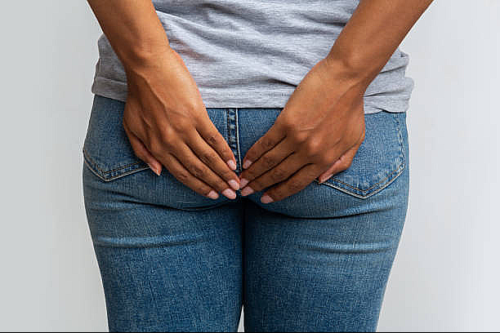Hemorrhoids are the kind of medical diagnosis that folks usually keep to themselves. The common benign medical condition can be painful, itchy and make you feel uncomfortable but they are often easily treated and pretty preventable.
It is estimated that around half of Americans develop hemorrhoids by time they are aged 50 and only a small proportion of those people seek help. The number of folks suffering from hemorrhoids is approximately 10.4 million and 1 million new cases occur each year. Ten to 20% of those new cases require surgery.
What are hemorrhoids?
Hemorrhoids, also known as piles, are swollen veins inside of your rectum (connects your colon to your anus) or outside of your anus (the canal where your poop comes out) that can cause pain, itching, and rectal bleeding. As a matter of fact, we are all born with hemorrhoids but they don’t bother us. Now, when the veins become inflamed, they will give you the blues!
Causes
Typically, tissue inside the anus fills with blood to help control bowel movement. Hemorrhoids form when there is way too much pressure on the pelvic and rectal area veins. If you have a strained bowel movement, the increased pressure causes the veins in this tissue to swell which brings on hemorrhoids.
Constipation is not the sole cause of hemorrhoids; diarrhea can bring them on as well because straining can occur in both situations. Being overweight can also put someone at risk for hemorrhoids. And if you have a family history of hemorrhoids chances are you might also inherit the problem.
“Sitting for long periods of time on the toilet in general can worsen hemorrhoid symptoms. Lifting heavy weights with the upper body can also bring on hemorrhoids, as doing so, strains the blood vessels around the anus. Men often come to see me with painful hemorrhoids after becoming dehydrated while doing strenuous physical activity,” says Robert R. Cima, M.D., a colon and rectal surgeon at the Mayo Clinic in Rochester, Minnesota.
Signs
The symptoms for both internal and external hemorrhoids can result in:
- Bleeding that is usually bright red after a bowel movement
- Rectal itching
- Rectal pain or discomfort especially when you wipe
- A bulge outside of the anus after passing a stool
When to see a doctor?
You should see a gastroenterologist who specializes in digestive diseases, when hemorrhoid symptoms are persistent or severe. A word of caution, you should ALWAYS get rectal bleeding checked so that a doctor can rule out more serious health issues.
Hemorrhoids can usually clear up on their own, often with just an over-the-counter preparation. If symptoms are more annoying, a doctor can prescribe a medicine that is effective at tackling your symptoms.
Embarrassment should never come into play when letting your doctor examine you for hemorrhoids!
Prevention
Making healthy and helpful lifestyle changes can reduce the incidence of hemorrhoids:
- Include more fiber in your diet like veggies, whole grains, beans, nuts, and fruits, obtain at least 20 to 35 grams
- Increase your intake of water and cut down on caffeine and alcohol
- Don’t ignore the urge to empty your bowels
- Steer clear of meds that can bring on constipation
- Exercise and lose weight if overweight
- Do NOT sit too long on the toilet
Treating hemorrhoids
In many cases, just an OTC med will work to reduce inflammation and stop the itching. A doctor may advise using a stool softener to avoid straining during bowel movements.
If hemorrhoids are severe, a physician may choose to:
- Cut off the vein’s blood supply to the hemorrhoid with rubber band ligation
- Electrocoagulation: An electric current stops blood flow to a hemorrhoid
- Infrared coagulation: A small probe is inserted into the rectum that transmits heat to the hemorrhoid
- Sclerotherapy: A chemical is injected into the swollen vein to destroy the hemorrhoid tissue
Surgery to remove hemorrhoids might be considered if all other treatments fail.
Can hemorrhoids reoccur?
Yes! Sometimes it takes a year or two, sometimes longer, but they can come back again after any treatment. They can even come back after surgery, but usually not for a long time.











